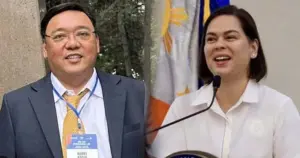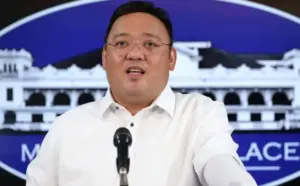
VP Sara Impeachment: Harry Roque Blames House of Representatives for Halting the Case
In a political twist that has sparked debate across the country, former presidential spokesperson and lawyer Atty. Harry Roque publicly criticized the House of Representatives for allegedly failing to fulfill its constitutional duty regarding the VP Sara impeachment complaint filed against Vice President Sara Duterte. Roque’s strong words have reignited public interest in the VP Sara impeachment issue and raised questions about the balance of power, accountability, and the role of political alliances in the legislative process.
This controversy has laid bare the complex dynamics at play in Philippine politics, especially as the country gears up for the 2025 midterm elections. With the Duterte family’s enduring political influence and the Marcos-Duterte alliance constantly being tested, the impeachment complaint against VP Sara—however short-lived—has become more than just a legal matter; it has become a litmus test for political integrity and institutional independence.

Background of the VP Sara Impeachment Issue
The impeachment complaint stemmed from allegations that Vice President Sara Duterte committed grave abuse of power and misconduct, especially in her concurrent role as Secretary of the Department of Education (DepEd). Critics accused her of misusing confidential funds and engaging in questionable budgetary practices—issues that have also plagued other government offices.
Although VP Sara impeachment is a political process and not a purely legal one, the complaint was expected to undergo thorough deliberation in the House of Representatives. However, it was swiftly dismissed or shelved, leading many to believe that political loyalty and power dynamics overshadowed the legal merits of the case.
Harry Roque Speaks Out
Atty. Harry Roque did not mince words in expressing his disappointment with how the House handled the impeachment complaint. In a public statement, Roque lamented that the lawmakers “betrayed the Constitution” by refusing to allow the complaint to go through the proper process. According to Roque, the House had an obligation to at least refer the complaint to the appropriate committee for review.
Roque emphasized that the Constitution mandates the House to act as the sole initiator of impeachment cases and must not suppress complaints on political grounds. “Impeachment is a sacred constitutional process meant to hold top government officials accountable. By disregarding it, the House is setting a dangerous precedent,” he said.

A Look at the Grounds for VP Sara Impeachment
The complaint against VP Sara Duterte primarily focused on the following issues:
- Misuse of Confidential and Intelligence Funds (CIF): Critics questioned the allocation and use of CIF under the Office of the Vice President and the Department of Education. While the OVP is not traditionally associated with intelligence operations, it allegedly received hundreds of millions in CIF.
- Unconstitutional Spending: Some lawmakers and watchdog groups argued that the CIF allocations violated budget rules and lacked transparency, raising suspicions of pork-barrel-style allocations.
- Misconduct in Office: There were allegations of political favoritism and retaliatory actions against education officials who challenged Duterte’s policies or questioned DepEd directives under her leadership.
Although these grounds may seem politically charged, proponents of the complaint argue that they merited at least a preliminary investigation—something the House of Representatives failed to pursue.
Why the House May Have Backed Off
Despite the seriousness of the allegations, political observers believe that multiple factors contributed to the dismissal of the impeachment complaint:
- Fear of Political Fallout: Vice President Sara Duterte remains one of the most powerful political figures in the country. Going against her could alienate members of Congress who rely on Duterte support for local projects and electoral backing.
- Marcos-Duterte Alliance: Although tensions between the Marcos and Duterte camps have surfaced, their political alliance remains intact on the surface. Allowing the impeachment to proceed may have jeopardized this alliance.
Preservation of Political Capital: House leaders may have opted to conserve political capital for future battles, especially as the country prepares for the 2025 elections. They may have feared that pushing the impeachment would divide the coalition or trigger backlash.
Public Reactions and the Role of Media
Public opinion has been split. While Duterte loyalists dismissed the impeachment as a political stunt, other sectors—especially watchdog organizations and academic institutions—expressed alarm at what they perceive as an erosion of accountability mechanisms.
Media coverage has highlighted the selective application of justice in Philippine politics, noting that officials who belong to powerful clans or ruling coalitions seem to enjoy immunity from scrutiny. The dismissal of the VP Sara impeachment complaint, in this context, adds to a growing perception that some government officials are beyond reproach.
Roque’s remarks resonated with many of these groups. “When Harry Roque—a known Duterte ally—speaks against the system, it means something is deeply wrong,” said a political science professor from the University of the Philippines.
Legal and Constitutional Implications
Constitutionally, the House of Representatives is the only body that can initiate impeachment proceedings. However, this authority comes with the responsibility to ensure that every complaint—especially those with substantial evidence—is heard objectively.
By shelving the VP Sara impeachment complaint without proper deliberation, critics argue that the House may have violated the spirit, if not the letter, of the Constitution. “The Constitution provides the framework, but its integrity depends on those who interpret and implement it,” Roque pointed out.
Legal experts warn that this sets a dangerous precedent where political convenience trumps constitutional duty. “If Congress can silence valid complaints against powerful figures, then we have effectively rendered the impeachment clause useless,” said a former Supreme Court justice.
The Bigger Picture: 2025 and Beyond
This controversy comes at a time when the political landscape is rapidly shifting. With the midterm elections on the horizon, political camps are realigning, and future presidential contenders are beginning to emerge.
VP Sara Duterte, who remains a strong contender for the presidency in 2028, may have benefitted in the short term from the House’s inaction. However, critics argue that the cloud of unresolved issues may eventually catch up with her, especially if a future administration revisits the allegations.
Meanwhile, Atty. Roque’s vocal criticism has positioned him as a rare voice willing to speak against his own political allies. Whether this is a sign of genuine concern or a calculated political move remains to be seen, but it has certainly stirred the pot.
What Comes Next?
There are calls from various civil society groups to revisit the impeachment complaint and allow it to undergo proper deliberation. Some are also urging the Supreme Court to weigh in on whether Congress acted unconstitutionally by ignoring the complaint.
Moreover, the controversy has prompted broader discussions about the need to reform the impeachment process to insulate it from political interference. Suggestions include:
- Creating an independent impeachment committee not solely controlled by House leadership.
- Setting clearer timelines and requirements for deliberating complaints.
- Enhancing transparency by requiring public hearings for high-level cases.
While these reforms will require constitutional amendments or legislative overhaul, the current issue has clearly demonstrated the urgent need for change.
Conclusion: A Test of Democratic Maturity
The halted of VP Sara impeachment has become a flashpoint for deeper issues within the Philippine political system—issues of transparency, accountability, and the separation of powers.
Atty. Harry Roque’s public rebuke of the House of Representatives has brought these concerns into sharper focus. Whether one agrees with him or not, his words challenge the political establishment to reflect on the kind of democracy it is building.
As the 2025 midterms approach, this issue will likely remain part of the national discourse. The real question now is whether Filipino institutions are strong enough to rise above political interests—or whether they will continue to falter under the weight of convenience and power.
For now, the VP Sara impeachment issue may have been stalled, but the conversation it sparked is far from over.
You May Visit:
- True Ka Jan FB Page
- True Ka Jan Tiktok Accout
- Tatlong Pilipino sa Tuktok ng Mount Everest
- Freddie Aguilar: Honoring the Life, Legacy, and Music of an OPM Legend
- BINI 4th Anniversary
- Impeachment Vs VP Sara

